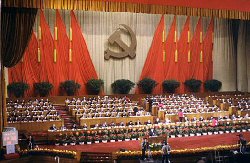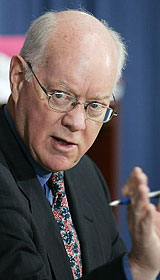 Today Conservative Party of Canada Critic for International Cooperation Helena Guergis asked an interesting question:
Today Conservative Party of Canada Critic for International Cooperation Helena Guergis asked an interesting question:
“Why is Paul Martin still giving Canadian Foreign Aid to Communist China?”
Ms. Guergis asked the question in response to China’s donation of millions of dollars towards the United States for hurricane relief.
“I think it only makes perfect sense that the country with the world’s second largest economy would help out the United States in its hour of need but it looks to me like they’re just turning around and using the money of Canadian taxpayers … Usually China props up corrupt countries like Sudan [] with the cash Paul Martin gives them, in this instance we should be happy that they are using some of our money to help the victims of Hurricane Katrina” — Helena Guergis, Conservative Party of Canada
Why is Canada giving foreign aid to the country with the world’s second largest economy? I can see Canada providing emergency support in the time of a devastating crisis as with the recent hurricane disaster in the United States, but why is Canada providing a regular level of foreign aid to China?
According to the CIDA website, Canada is providing China with $8 million dollars for environmental management training in Jiangsu province. (project A-019759):
This project responds to severe environmental degradation and industrial pollution linked to the rapid growth of township and village enterprises (TVEs) in the Province of Jiangsu, most of which are small and medium-sized enterprises (SMEs). It will provide assistance in management and in environmental/business planning capacity of TVEs; promote enterprises’ awareness of waste minimization, cleaner production and more environmentally sound technology alternatives through loans from the project environment revolving fund (ERF), demonstration/pilot projects and through training of trainers and support to local training capacity. The project will contribute to investments in enterprise-upgrading and the transfer of environmentally sound technologies through a $3.6 million environment revolving fund equally financed by China and CIDA. The original geographical focus was on Southern Jiangsu but it is gradually moving to poorer Northern Jiangsu. The project will also support sectoral linkages and information exchange between Canadian industries and Jiangsu TVEs in the sectors of focus of the project (chemical, food processing, metal working and textile).
Ms. Guergis asks an interesting question. Why is Canada giving foreign aid to the country with the world’s second largest economy? I can see Canada providing emergency support in the time of a devastating crisis as with the recent hurricane disaster in the United States, but why is Canada providing a regular level of foreign aid to China?
 The NDP claims to be working for the average Canadian, yet their policies are way out of touch. Furthermore, their plans for dealing with Canada’s growing dependence on gas and Canada’s management of this resource are ill-conceived.
The NDP claims to be working for the average Canadian, yet their policies are way out of touch. Furthermore, their plans for dealing with Canada’s growing dependence on gas and Canada’s management of this resource are ill-conceived. Justice John Gomery has
Justice John Gomery has